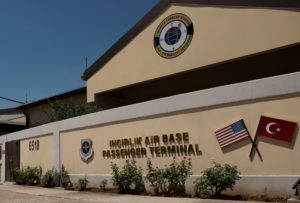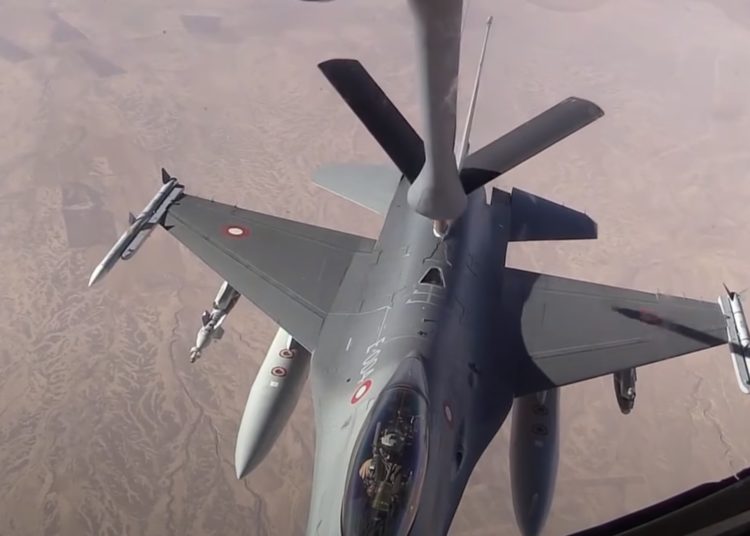Abdullah Bozkurt/Stockholm
Turkish authorities secretly investigated two fighter jets deployed by the Royal Danish Air Force (RDAF) at Incirlik Air Base in southern Adana province, according to documents that were part of a criminal investigation into a 2016 coup attempt in Turkey.
The landing of the Danish F-16s with tail numbers E-606 and E-018 and call sign Venom-01 at the Turkish base on the morning of July 15, 2016 were investigated by Turkish authorities who looked at the activities of the combat jets at the base.
The RDAF combat jets used the Turkish base as part of the US-led Operation Inherent Resolve (OIR) to defeat the Islamic State in Iraq and Syria (ISIS), which maintained control over parts of Syria and Iraq at the time.
Denmark had supplied seven F-16s, a C-130J transport aircraft and 400 military personnel, including 60 special forces troops, to OIR between 2014 and 2016.
Turkey had been reluctant to give expanded access to US coalition partners since 2014 but reluctantly agreed to it in 2015. It opened not only Incirlik Air Base but also other facilities to the US and other coalition partners, allowing more than 60 aircraft with some 1,200 personnel to be deployed in counter-ISIS operations.
The secret list that detailed the arrival of two Danish F-16 combat jets at Turkey’s Incirlik Air Base on July 15, 2016:
The wide net cast by prosecutors in the investigation into the attempted coup that involved Incirlik looked more like a fishing expedition and appears to have been designed to help feed into the false narrative of the government of President Recep Tayyip Erdoğan, which claimed that the US was the mastermind behind the abortive putsch, although there has been no evidence presented to support that claim.
The information about the Danish F-16s was provided by Brig. Gen. Irfan Özsert, the acting commander of the base, on July 24, 2016. The role Gen. Özsert played at Incirlik during the July 15 events was questioned by military experts who highlighted the unexplained nature of a mysterious assignment given to Özsert before the coup attempt. While he was accusing his colleagues, including then-commander of Incirlik Air Base Staff Lt. Gen. Bekir Ercan Van, of involvement in the coup, Özsert claimed he was on temporary duty at Incirlik but did not explain what that temporary assignment was. He later assumed interim command of the base after Van’s detention.
It was also quite odd that while the Turkish command at Incirlik was on terrorism alert and troops were deployed to counter a possible attack, Özsert kept his distance from the rapid deployment at the base to beef up security for reasons that were not explained. According to the court documents, he ignored the chain of command and did not report to his superiors, but instead talked to an unidentified person in Ankara and apparently received a different set of instructions while his colleagues were ordered within the chain of command to report to their positions.
The alleged involvement of the Incirlik base, where troops and military assets of the US and other NATO allies were deployed, in the military mobilization on July 15 was an important part of the government storyline in the false flag coup, with Turkish officials publicly accusing NATO allies, especially the US, of being behind the putschist attempt. There has been no evidence presented by the government to support accusations that US and other NATO allies were involved in the military mobilization on that night.
For the unrevealed role in the July 15 events he played in and around Incirlik Airbase, Özsert was rewarded by President Erdoğan and promoted to major general two weeks after the failed coup. He was one of only four generals to attain that rank that year, while two-thirds of all flag officers in NATO’s second largest army were dismissed and/or jailed on dubious terrorism and coup plotting charges. He was later appointed to head the General Staff Intelligence Directorate (Genelkurmay İstihbarat Başkanlığı). In August 2019 he was promoted to the rank of lieutenant general.

Özsert and his team of defense and intelligence officials were exposed when their passports were published by the al-Marsad news outlet in 2019. They were reportedly involved in classified military and intelligence operations in Libya, where the Erdoğan government was providing military equipment, technical expertise and military assistance to armed Islamist groups. He is currently head of the Defense’s Ministry Defense and Security Directorate (Milli Savunma Bakanlığı Savunma ve Güvenlik Genel Müdürlüğü).
A significant amount of evidence was uncovered during trial proceedings indicating that the putschist attempt was actually cooked up by the Turkish president and his intelligence and military chiefs as part of a long-planned purge of pro-NATO officers from the alliance’s second largest army. Many officers including the commander of Incirlik Air Base were jailed on dubious charges and in the absence of evidence of any wrongdoing.
An investigation of foreign troops deployed to Turkey as part of OIR was conducted by Turkish prosecutors with a total disregard for due process and due diligence and reflected the rapid slide of Turkey away from its NATO allies.
In December 2016 Denmark announced that it would not extend its mission at OIR and decided to withdraw its fighter jets.
Secret document signed by Gen. İrfan Özsert, who provided classified information to the Adana Public Prosecutor’s Office:
Nordic Monitor previously published government documents confirming that US troops and contractors were investigated by Turkish prosecutors in multiple provinces over meetings and assignments that were not related to the coup.
On one occasion, a Turkish prosecutor launched a criminal investigation into US officials and American defense contractor Lockheed Martin representatives over meetings on July 12-13 that dealt with part of a modernization program for Turkish F-16 fighter jets.
The allegations that the US was involved in the attempt were made publicly by Turkish government officials at various times. Interior Minister Suleyman Soylu accused the US of orchestrating the coup on July 16 while events were still unfolding. He repeated the same allegation on a number of occasions, saying that vocal Erdoğan critic Fethullah Gülen lacked the capability of mounting such an attempt.
The government accuses Gülen, a 79-year-old cleric who has been living in the US since 1999, of being behind the failed coup although no evidence has been presented to prove the claim. Gülen himself denied playing any role and asked for an international inquiry to ascertain the real perpetrators, a proposal that Erdoğan declined.

Turkish government officials raised the possibility of shutting down İncirlik Air Base amid growing differences with the US on a number of issues including the Erdoğan government’s purchase of long-range missiles from Russia and Turkish military operations in Syria and the eastern Mediterranean.
In January 2018 Turkish Foreign Minister Mevlüt Çavuşoğlu said on government TV network TRT that he had delivered to then-Secretary of State Rex Tillerson the Turkish people’s demands regarding İncirlik during a meeting in Vancouver. In July 2018 Erdoğan for the first time raised the issue of closing İncirlik Air Base to the Americans, followed by similar comments from his neo-nationalist ally Doğu Perinçek.
With the unprecedented purge of over 4,000 judges and prosecutors and their replacement by partisan, Islamist and neo-nationalist candidates in 2016, Turkish prosecutors and judges are seen as political whips in the hands of the government, which often abuses the criminal justice system to intimidate critics at home and convey political messages to foreign governments.
Many believe the limited military mobilization in 2016 was a false flag operation orchestrated by Erdoğan himself to consolidate power in his hands, push the Turkish military into operations in Syria and Libya and prosecute his opponents on fabricated criminal charges.












